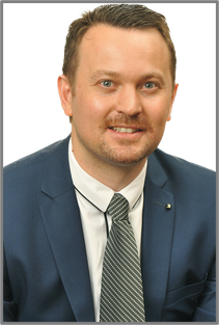
Dr Rümando Kok
Interview between Prof Pieter Kruger, director of the CHHP, and Dr Rümando Kok
Navigating human relationships can be a maze of conflict and misunderstandings, especially in the close-knit relationship dynamics of couples and families. The North-West University’s (NWU) Centre for Health and Human Performance (CHHP) is actively promoting healthy interpersonal relationships through expert-led conversations and therapy sessions.
Dr Rümando Kok, senior psychologist and clinical lead at the CHHP, says a positive new trend is emerging. Younger couples are increasingly seeking therapy as a preventive measure before getting married or entering long-term relationships.
“It seems to be a generational shift. They view it as an investment in their relationship rather than a last resort. This reflects a healthy, progressive attitude to mental well-being and to addressing possible obstacles in their relationships head-on.”
He says therapy and counselling can provide a sort of “psychological X-ray” of a relationship, empowering couples to understand their specific dynamic, strengths, weaknesses and possible sources of conflict. “It helps them to identify issues they should work on from the start to ensure a strong and healthy relationship.”
Relationships are systems
Counselling and therapy are also very beneficial to families. Dr Kok explains that when psychologists work with couples, they view them as a single dyad – one pair with two parts. “It is a two-person relational system. A family dynamic is different. It involves multiple dyads that can include the romantic partnership between parents, their relationships as caregivers, and the connections between parents and children. “Each relationship affects the others, creating a complex system of interactions,” says Dr Kok.
He explains that couples and family therapy focus on understanding how these systems function and where relational patterns may have become ineffective. “Families usually approach us when these systems are not functioning optimally.”
Conflict is a common reason for therapy
Conflict remains the most common reason families seek help. “People often become reactive instead of interactive, or reflexive rather than reflective,” says Dr Kok. Other issues include infidelity, communication difficulties, unclear roles and emotional disconnection.
He adds that many conflicts arise from unspoken assumptions. “People assume responsibilities without talking about them. These implicit expectations easily lead to tension.”
Emotional disengagement is another challenge. “Families may manage daily routines well but still feel disconnected emotionally.”
Power dynamics and flexibility
Power struggles are also a recurring theme. “We talk about ‘one-up’, ‘one-down’ and ‘equal’ positions,” says Dr Kok. “Healthy relationships require flexibility to move between these roles. Problems arise when someone rigidly stays in one position.”
(One-up refers to a person attempting to dominate another; one-down refers to a person taking a subservient stance; and an equal stance reflects a balance.)
Dr Kok says therapy can also occur indirectly. “Even if the family does not attend together, one member can still influence the system.”
Practical advice for couples and families
Dr Kok offers three key strategies for nurturing healthy relationships:
- Aim for “good enough” rather than perfect. “Perfection is impossible in an imperfect world. Accept your limitations and do your best with what you have.”
- Communicate clearly. Avoid assumptions and ask directly instead of interpreting or guessing.
- Spend meaningful time together. “Quality matters more than quantity,” he says. “Be present by sharing meals, talking or playing together.”
He says whether the problem is relationship challenges or family difficulties, you don’t have to face them alone. “The CHHP offers professional support to help strengthen connections and promote healthy family systems.”
For more information email IPWinfo@nwu.ac.za or visit https://health-sciences.nwu.ac.za/centre-health-human-performance/psych…
